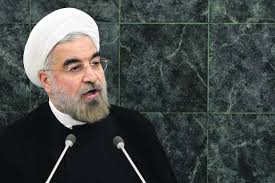 The five-year rally in Iranian stocks is coming to an end as optimism fades that President Hassan Rouhani can resolve an international standoff over the Islamic republic’s nuclear program.
The five-year rally in Iranian stocks is coming to an end as optimism fades that President Hassan Rouhani can resolve an international standoff over the Islamic republic’s nuclear program.
The Tehran Stock Exchange Index has lost 19 percent in 2014, set for the first yearly decline since 2008, as petrochemical companies and lenders plunged, bourse data show. Over the previous five years, shares soared 910 percent, or about 300 percent in dollar terms after factoring in the rial’s declines.
Progress on talks with world powers stalled last month, undermining confidence that Rouhani’s election in June 2013 would spur a detente with the U.S. The two sides announced Nov. 24 they’d need another seven months to try to end a decade of international sanctions that are throttling the economy. The six-month plunge in oil, Iran’s biggest income source, deepened the selloff.
“After the spike on the back of the potential for rapprochement, continued negotiation extensions have weighed on” stocks, Emad Mostaque, a London-based strategist at Ecstrat Ltd., said by e-mail Dec. 12. “The market retains significant upside potential in the medium and long term, but low oil prices and continued economic adjustment are likely to weigh in the short term.”
Trading Slides
Trading slid this year, with $102 million shares changing hands on average by December, compared with $203 million a year earlier. By comparison, stock trading in Saudi Arabia, the region’s biggest market, averaged $2.3 billion, data compiled by Bloomberg show.
While foreigners can invest in Iranian stocks, regulations vary depending on how they’re categorized. Overseas money managers are classified as ‘portfolio investors’ if they hold up to 10 percent of a company’s shares, or ‘strategic investors’ if they own from 10 to 100 percent, according to Tehran-based investment boutique Turquoise Partners.
Equities more than doubled last year as Rouhani, considered the most liberal of presidents approved byAyatollah Ali Khamenei, reached an interim accord with the U.S., U.K., France, Germany, China andRussia in November 2013 to ease sanctions on crude exports in exchange for caps on nuclear work.
The exchange’s market value climbed 38 percent since 2011 to $120 billion, compared with $484 billion for Saudi’s exchange. Saderat Bank, subject to European Union sanctions since 2010, and Parsian Oil & Gas this year tumbled more than 31 percent from 53-week highs.
“There were positive expectations and hopes as we approached the deadline,” Homayoun Darabi, an individual investor, said in Tehran on Dec. 7. “The fact that there was then no agreement meant that people pulled out.”
Oil Factor
Iranian Foreign Minister Mohammad Javad Zarif said earlier this month talks are near “successful end.” Negotiators will meet again on Dec. 17.
Iran’s revenue from crude sales fell 30 percent because of oil’s plunge, which could put pressure on the budget, Rouhani said Dec. 8.
The government, which assumed a price of $100 for a barrel in the fiscal year through March, is basing its 2015 spending plan on an average of $72. Brent fell to $61.85 last week, extending the drop from this year’s peak to about 46 percent.
“It is hard to say which had a bigger impact — the negotiations or oil — but in my view, the biggest factor was disappointment that came after weeks of optimism on a potential nuclear deal,” Ramin Rabii, managing director at Turquoise, said by e-mail Dec. 9. This year’s decline “was a very natural market correction,” he said.
Inadequate Relief
The $7 billion in sanctions relief secured last year spurred bets Iran’s $366 billion economy would recover from a recession. The relief has proven less valuable than initial expectations, a U.S. administration official said in November.
With crude comprising 15 percent of gross domestic product and “significant” foreign-exchange reserves, Iran can “fund the full oil income portion of the budget for a year even with zero oil income,” according to Rabii.
Iran’s economy will expand 1.5 percent in 2014 after shrinking 5.6 percent and 1.7 percent in the previous two years respectively, according to International Monetary Fund estimates in April, prior to crude’s slide. The IMF forecasts inflation will slow to 23 percent in 2014 from 35 percent last year.
The 420-member Tehran Stock Exchange fell 7.2 percent the past month and traded at 5.5 times reported earnings at the end of November. That compares with 15 for Saudi stocks.
“Euphoric rally buying can only last so long,” Ecstrat’s Mostaque said. “The final hurdles are primarily on the political side.”
Bloomberg

Leave a Reply
You must be logged in to post a comment.